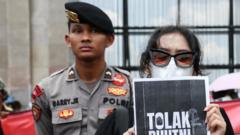Opposition mounts as critics believe the recent amendments to Indonesia’s military law will revive the authoritarian past and undermine democracy.
Military's Expanded Role in Indonesian Government Sparks Outrage and Protests

Military's Expanded Role in Indonesian Government Sparks Outrage and Protests
Indonesia's military law changes, backed by President Prabowo, raise fears of returning to authoritarianism.
Indonesia’s parliament has ignited national outrage with recent amendments to military legislation permitting a more substantial military presence within the government. The revisions, championed by President Prabowo Subianto, historically linked to the authoritarian Suharto regime, enable active military personnel to hold posts in 14 civilian institutions—up from 10—without having to retire from service.
Pro-democracy activists, worried about the implications of this decision, have mobilized outside parliament, gathering in numbers exceeding a thousand by Thursday evening. Their protests echo sentiments shared by many, suggesting that these changes signal a return to the oppressive tactics reminiscent of Suharto's military dictatorship, which lasted from 1966 until 1998. “The military should only manage barracks and national defence,” said Wilson, an activist representing the Indonesian Association of Families of the Disappeared (KontraS). “Today marks the peak of creeping democracy murder.”
The amendments also extend the retirement age for military officers, allowing four-star generals to remain in service until the age of 63. This fundamental shift in military engagement raises alarms about the potential redirection of Indonesia’s political framework under Prabowo's leadership. Dedi Dinarto, from the public policy advisory firm Global Counsel, articulates concerns that embedding military officials in civilian roles could skew governance towards prioritizing authority and stability over democratic principles.
Prior efforts have sought to minimize military influence in governance, yet reports highlight that nearly 2,600 active-duty officers were already positioned in civilian capacities prior to the amendments. Activists argue the military’s dual functions, defined during Suharto’s governance, threaten to resurface, endangering civil liberties and justice. "If the military gains influence over the justice system, who will hold them accountable?" questioned Virdika Rizky Utama of PARA Syndicate.
In response to criticisms, Defense Minister Sjafrie Sjamsoeddin has defended the amendments, citing shifting geopolitical dynamics and technological advancements as necessitating an evolved role for the military in managing conflicts. However, activists insist that a heightened military role in civic matters could considerably undermine impartiality.
As protests continue, voices like Sukma Ayu, an activist and student, emphasize the importance of resilience saying, “This long struggle cannot stop just because the law has been passed. We will keep protesting until we claim victory.” The government’s swift adoption of these laws has been criticized by human rights groups, further complicating Indonesia's political landscape as fears of authoritarianism loom large amidst ongoing public dissent.


















